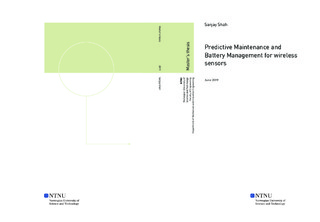| dc.description.abstract | Wireless sensor networks (WSNs) becomes an emerging technology and has been adopted by several companies for data communication and processing. Many leading companies use wireless sensor’s network for different purposes. Each sensor is powered by lithium thionyl chloride (LTC) batteries. LTC batteries are non-re-chargeable. Hence, as and when the battery gets discharged beyond the acceptable limits, it must be replaced by a new battery. This thesis aims to find an optimum replacement strategy that minimizes the replacement cost without compromising on the availability of WSNs.
A relevant literature review is performed to find out the critical concept of battery management and its discharge phenomena for a wireless sensor’s network. Most of the available literature is only limited for rechargeable batteries but not for the LTC battery which we are searching. One of the research works shows that battery replacement and sensor replacement is identically the same in the context of cost. Based on this information, a literature search for this thesis is shifted from battery replacement to sensor replacement as a part of the maintenance operation.
Relevant literature review regarding failed sensor node replacement is carried out, and only three research articles are found. Those three articles are thoroughly summarised in this project. The first articles used the Markov decision process (MDP) and proposed a solution with the sensor replacement as the only maintenance operation. The second article suggests four different replacement strategies with a mathematical model whereas the last article describes the homogenous and heterogeneous nature of wireless sensor networks and performs a maintenance action by introducing multi-cluster management technique to replace the failed node.
In this thesis, a probabilistic model is developed to find the optimal policy for node replacement by comparing the expected long-run cost of each policies. Long run cost includes replacement cost and performance loss rate in terms of cost. The optimal policy is the compromise between replacement cost and performance loss. A qualitative study is performed by setting up a hypothetical wireless sensor network comprised of ten sensor nodes with assumed parameters. An expected long-run cost for each policy is calculated, and the results are plotted. Finally, the sensitivity analysis is performed to check the variation of long-run cost by changing the value of different parameters. | |
